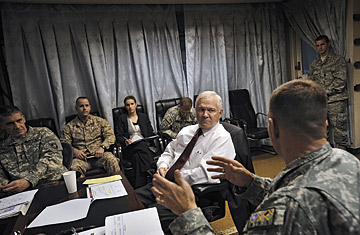
Gates being briefed at Camp Eggers in Kabul during a tour of Afghanistan last December.
(11 of 12)
I was reminded of the power of the Pentagon corporation last fall when I followed Gates on his visit to the modern-day riveters of Oshkosh. We went to a factory where they were manufacturing off-road vehicles that could withstand the Afghan Taliban's powerful new IEDs. The workers were heavyset, rough-hewn men and women in unlaced boots, jeans, flannel shirts and goggles. Gates' patriotic speech moved them. One woman told me that whenever she didn't feel like doing her job tightening those screws, she reminded herself that she would be saving the life of Johnny from next door. Most of the workers travel long distances to the factory. All along the road to the airport were boarded-up businesses and FOR SALE signs. Oshkosh Corp., under contract with the Pentagon, is one of the few employers around.
As steward of that Pentagon machine, Gates does not like to lose the narrative or flow of information. Leaks irritate him almost as much as bad performances. But his desire to place some limits on what the public sees has put him at odds with some of this Administration's political supporters, who say Obama campaigned on promises to change the culture of secrecy that marked the Bush years. Many of Obama's liberal supporters were flabbergasted when Obama, through Gates, reversed the decision last year to release photographs from the Abu Ghraib scandal as well as cases of military abuse of detainees that had been withheld by the Bush Administration. Gates personally issued an angry letter to the Associated Press after it distributed a photograph of a soldier dying in Afghanistan, against the wishes of his family. The AP argued that the public needed to know what was going on there. "If you apply the standard that [the Pentagon] decides what images the public will see, think of the civilian massacres we would not know about. The poor girl in Vietnam running naked down the street away from napalm," says Ben Wizner of the ACLU. "It's very important for us to have that documentary history. The backlash they are most concerned about is from the American public, not the world public."
The Dealer
Anyone who's known Gates over the years will tell you he's a guy who holds his cards close to his vest and knows just when to play them. His timing is impeccable, his negotiating skills unbeatable. A man of few hobbies--hiking, B movies and books--he loves to play hardball buying cars. His bargaining skills are so legion that a car salesman asked him, "Where the hell'd you learn to negotiate?" Gates replied, "I had a lot of practice with the Soviets," allowing an example of Washington bravado to leak from his lips. Negotiating what he wants in the corridors of power--no one does it better, say his friends.
What is the end of all that dexterity? Is there a Gates vision or doctrine? Or is the end the master he serves, the duty of service, like the Eagle Scout he was? When I put this question to him, he talked about the consistent focus on reforming the Pentagon's way of thinking about war and seeing the wars in Iraq and Afghanistan through.
At that point, an aide stepped in and said he was concerned that I was being too polite; what I really meant was that he's a chameleon who adapts to the people he works for but lacks a strong vision.
